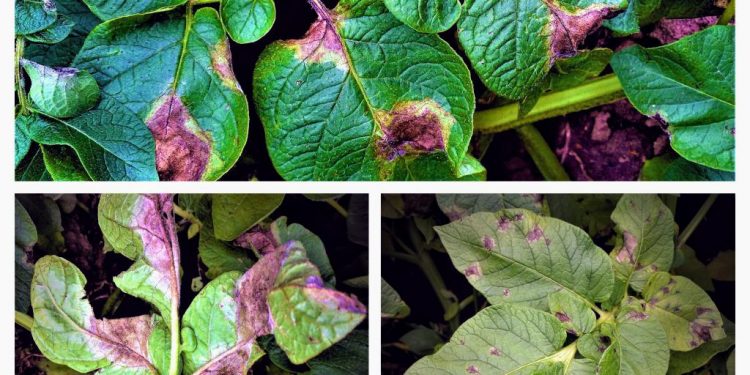Late blight caused by Phytophthora infestans is the leading killer in potato production, which can cause the death of leaves and stems and tubers to rot, seriously threatening potato yield and causing huge economic losses. In the 1840s, potato late blight triggered the ‘Great Irish Potato Famine,’ causing more than one million Irish people to die of starvation. At present, the control methods of potato late blight mainly include chemical control, cultivation of resistant varieties and biological control. Chemical control by spraying fungicides (infinito, mancozeb, fluazinam, dimethomorph, cyazofamid, etc.) is the most important means. However, long-term overuse of chemical fungicides may lead to environmental pollution, food safety and human health threats. Moreover, Phytophthora infestans can quickly develop resistance to fungicides, making them ineffective. For example, metalaxyl was once the most effective fungicide against potato late blight, but its antifungal effect has gradually been lost due to the emergence of drug-resistant strains. In recent years, more attention has been paid to environmentally friendly control methods, such as cultivation of resistant varieties and biological control. Resistant varieties can be obtained by means of cross breeding and genetic engineering. However, hybrid breeding is time-consuming and laborious, and many disputes over transgenic technology are also an obstacle. Moreover, due to the rapid variation and evolution of Phytophthora infestans, it is easy for it to quickly overcome the resistance of varieties, which makes the persistence of disease resistance poor. Biological control mainly uses beneficial microorganism and some bioactive substances to control diseases, which has the advantages of environmental friendliness and sustainability. Bacillus, Pseudomonas, Streptomyces and Trichoderma were the main reported biocontrol microorganisms to have inhibitory effects on Phytophthora infestans. Commercial products of Trichoderma and Bacillus have been applied to control potato late blight. However, although there has been some progress in the application of biocontrol microorganism, the effect of disease control is often not as good as that of chemical agents. Thus, it is important to find and develop new biocontrol agents with good effect for controlling potato late blight in the future.
Endophytes are microorganisms that colonize plant tissues without causing diseases or other adverse effects on the host. Endophytes, isolated from healthy plants in disease-problem habitats, may be more resistant to pathogens than introduced species because of their superior environmental adaptation. Endophytes have the ability to antagonize pathogens, induce plant defense and promote plant growth.
Bacillus were often well known as biocontrol bacteria. To evaluate the inhibitory effects of Bacillus subtilis H17-16 on Phytophthora infestans, H17-16 suspension (1 × 107 CFU/mL) was inoculated at equal distances (2 cm) around the central Phytophthora infestans mycelial disk, according to the dual culture method. The results showed that colony diameters of T30-4 strain and 88069 strain were remarkably decreased compared to the control after 5 days, with inhibition rates of 64.31% and 69.48%, respectively. Furthermore, the plates were observed again after being placed for several months, and it was found that mycelial growth of Phytophthora infestans was still inhibited and the hyphae were gradually eroded by H17-16. These indicated that H17-16 can significantly and persistently inhibit the mycelial growth of Phytophthora infestans.
Bacillus subtilis H17-16 has an obvious effect on inhibiting the sporangia germination of Phytophthora infestans.
The result revealed that Bacillus subtilis H17-16 could inhibit the pathogenicity of Phytophthora infestans on the leaves and reduce the incidence of potato late blight.
In summary, the laboratory tests revealed the significant potential in controlling Phytophthora infestans , but it is needed to perform field trials.
Photo: Maria A. Kuznetsova (All-Russian Phytopathology Research Institute, https://gd.eppo.int/taxon/PHYTIN/photos)
Reference: Zhang, J., Huang, X., Yang, S., Huang, A., Ren, J., Luo, X., Feng, S., Li, P., Li, Z. and Dong, P. (2023), Endophytic Bacillus subtilis H17-16 effectively inhibits Phytophthora infestans, the pathogen of potato late blight, and its potential application. Pest Manag Sci, 79: 5073-5086. https://doi.org/10.1002/ps.7717







